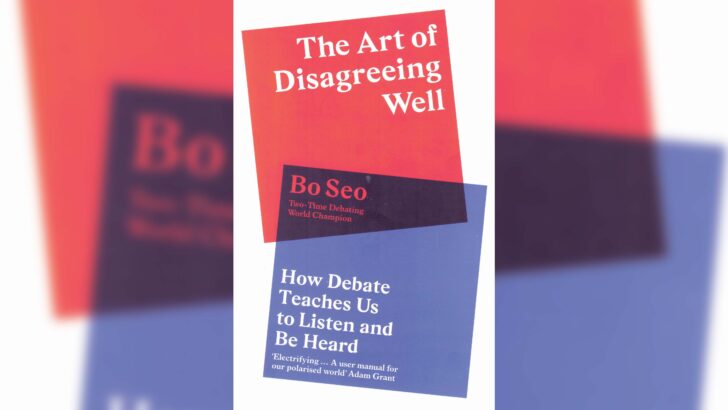The Art of Disagreeing Well: How Debate Teaches Us to Listen and Be Heard, by Bo Seo (William Collins, £14.99/€16.99)
Bo Seo, the author of this very interesting book, is of Korean background but was raised in Australia. He made his name as a school and college debater, and went on to build on this to work as a journalist but is now pursuing a legal career at Harvard. Altogether an interesting young man, and in this book he writes revealingly about his vocation as a persuader.
Having myself attended a school where the debating society was a renowned feature of our last years as school boys, I was in position to witness en blé some young men later distinguished in law, politics, and academic life.
Bo Seo is one of this ilk. He sees debating as a matter of winning support for your view to win out over your opponent. This is the model for law and politics that we derive from Greece and Rome, and still influences our social life.
From another point of view, however, what is required in both public and private life is not conquest but compromise, winning the widest possible acceptance for a position that allows for social cohesion. But as we have witnessed in the ballots for the Speaker of the House of Representatives in the USA, “No compromise” is the motto of all too many people active today in the world.
The culture of Greece and Rome, which was often far from peaceful and philosophical, is not the only way in the world, as anthropologists have shown us. But we in Europe, say, expect Asia to accept what we teach, it is not for us to learn from Asia. All too many Christians are happy to accept things from the Old Testament but to ignore the words in the Gospels that run quite contrary to them. They forget they are living under a new rather than an ancient covenant and dispensation.
As the book passes on to dealing with a bully, raising citizens, and “how to fight and stay together”, it becomes more serious. The final chapter, “How to debate in the future”, dealing largely with the internet, is altogether the most interesting.
This is a book for the school debater as well as those in public life. While a reader might want to have other aspects of debate, disagreement and resolution dealt with, this book will open horizons to even the most accomplished debater. Anything that can improve the quality of discussion in public life will be a worthy contribution to modern culture.
Though our own national assembly is, for the most part, a decorous place, compared with what we see in Washington, even our own TDs might learn from these pages.


 Peter Costello
Peter Costello
